Bahamas non-profit dives boldly into the future, trailblazing fight against Caribbean coral crisis

The Perry Institute for Marine Science (PIMS) celebrated its 50-year milestone anniversary last weekend, bringing together a mix of local and international stakeholders, partners and friends to commemorate its longstanding legacy of ocean conservation and scientific discovery in The Bahamas.
Despite being initially postponed due to the COVID-19 pandemic, the celebration drew a crowd of esteemed dignitaries, including former Attorney General of The Bahamas, The Honourable John Delaney; British High Commissioner to The Bahamas Sarah Dickson; Chargé d’ Affaires of the Embassy of Brazil, Mari Carmen Rial Gerpe; and Richard Wesch, Economic and Commercial Officer at the US Embassy.
“It is so amazing the incredible work that the institute has done for The Bahamas over the past 50 years … since 1970 PIMS has been researching coral reefs, coral reef management and all the very important things to our marine ecosystems,” said former Attorney General Delaney, who also serves as a board member for the non-profit Perry Institute.
Indeed, what began as a site-based research facility on Exuma’s Lee Stocking Island has evolved into a global leader undertaking marine research, conservation, and nature restoration projects throughout The Bahamas and the Caribbean. The Perry Institute’s track-record in The Bahamas began when it published some of the first studies of Nassau grouper, queen conch and Caribbean spiny lobster in the 1970s, laying the foundation for fisheries regulations throughout the region to this day.
Fast forward to the early 2000s when PIMS hosted the world’s first-ever conference on marine reserves. More recently, PIMS extensive surveying and mapping of coral reefs, fisheries and other coastal habitats has contributed to the designation of 37 Marine Protected Areas in The Bahamas. These efforts helped expand the country’s protected area system by approximately 5 million acres (or nearly 4 million American football fields). In celebration of its 50th Anniversary, PIMS announced that in 2022 it will provide scholarships for Bahamian youth to attend Windsor School’s Marine Academy. The prestigious high school program ignites students’ passions for healthy oceans locally by providing comprehensive training in marine biology through cutting-edge research, lab work and field excursions.
Speaking to the organization’s 50-year evolution, PIMS Executive Director and tropical marine ecologist Dr. Craig Dahlgren stated, “Over the past 10-15 years PIMS has seen some significant changes.” The death of John H. Perry Jr, who built the Institute on his love for the ocean, led to the sale of Lee Stocking Island in 2008. Dahlgren continued, “With change comes opportunity. I am so proud that we have shifted in focus from running a field station for visiting scientists and have emerged as a high-impact conservation organization. Our amazing team now works on research and conservation programs to address the most urgent issues facing marine resources and habitats in The Bahamas and broader Caribbean Sea.”
Adding Bahamian specifics, PIMS Senior Scientist Dr. Krista Sherman remarked at the event, “Our dedicated staff are working to tackle the devastating impacts of climate change on coral reefs; illegal, unreported and unregulated (IUU) fishing of our economically valuable fishery resources; and the unsustainable coastal development and pollution that threaten nearshore ecosystems and communities. Today, we are urgently working to address the ravaging impacts of Stony Coral Tissue Loss Disease (SCTLD) … a disease that rapidly kills hard corals at a rate of up to 50 meters [55 yards] per day.” Dr. Sherman was the first woman in The Bahamas to receive her doctorate degree in marine biology. Prior to joining PIMS she worked for the Bahamas National Trust, the Cape Eleuthera Institute, and the Atlantis Paradise Resort Aquarium.
The Perry Institute documented the first case of SCTLD in The Bahamas and was instrumental to the establishment of the The Bahamas SCTLD Task Force, in partnership with Government and other NGOs. The water-borne disease has spread to at least six different islands over the last two years. A renowned coral reef expert, Dr. Dahlgren underscored the disease’s magnitude to The Bahamian tourist economy: “For coral ecosystems, Stony Coral Tissue Loss Disease is as contagious as COVID and as deadly as Ebola to humans – sadly, this is not an overstatement. Climate change and SCTLD are a one-two punch that will put an end to coral reefs in The Bahamas as we know them unless we act now.”
Addressing the fact that Bahamian Government policy quixotically halted most scientific research throughout 2021, Dahlgren concluded, “We are eager to work with the government to rapidly understand – and in fact – treat this disease in The Bahamas. We hope there will be a break in this permitting log jam very soon so that the public and private sectors can work together to deploy life-saving antibiotics. This technology exists. We have even trained Government staff. We must act now.” On the frontlines of the coral crisis, PIMS also manages the largest network of coral nurseries used for restoration in The Bahamas, spanning 12 different islands and growing more than 7,000 critically endangered corals.
In his congratulatory remarks at the PIMS anniversary event, Richard Wesch of the US Embassy explained he sees the Institute’s work as critical to island nations like The Bahamas where the “threat of climate change isn’t a theoretical danger, the danger is here.” PIMS institutional credibility is as such that the US Government has been supporting its Bahamas science for the last half century.
Speaking about the Embassy’s continued support of scientific research in The Bahamas more broadly, Wesch emphasized, “We are committed to working with our Bahamian counterparts to get back to doing what we must – conducting essential research and sharing the information with the global community. I’m glad we have good partners and good will as we search for a way for The Bahamas to restart critical marine science.”
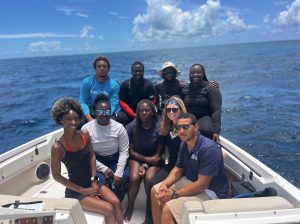
Become a PADI Dive Instructor in The Bahamas | Conservation-Focused IDC
Become a PADI Dive Instructor in The Bahamas | Conservation-Focused IDC | Perry Institute for Marine Science Education & Training Ready to take your diving skills to the next level
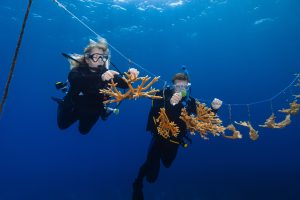
Stream2Sea Coral Care: The World’s First Reef-Positive Sunscreen
Stream2Sea Coral Care: The World’s First Reef-Positive Sunscreen | Perry Institute for Marine Science Conservation Partners Stream2Sea Coral Care: The World’s First Reef-Positive Sunscreen Discover why PIMS has partnered with

Build a Coral Reef for the Holidays | PIMS x Partanna
PIMS is partnering with Partanna to build a 100m² carbon-negative reef. Rick Fox is matching donations up to $25k. Help us build a sanctuary for the future.
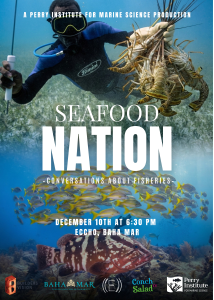
“Seafood Nation” Documentary Premiere Explores the Heart of Bahamian Culture and the Future of Fisheries
NASSAU, The Bahamas | December 5, 2025 – From the bustling stalls of Potter’s Cay to family kitchen tables across the archipelago, seafood is far more than just sustenance in
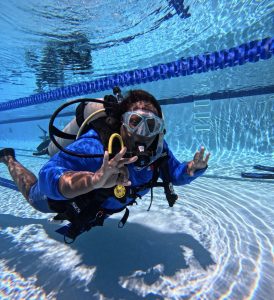
PIMS and Disney Conservation Fund Partner to Train 19 Government Divers
PIMS dive training in Nassau strengthened national coral restoration capacity across government agencies. Bahamas Dive Training Builds National Coral Restoration Capacity Last fall, between the months of September and October,
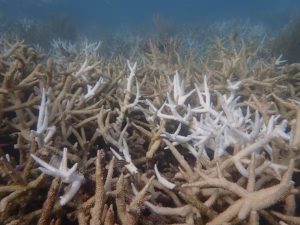
Florida’s Coral Reef Crossed a Line: What Functional Extinction Really Means for Elkhorn and Staghorn Corals
Reefs didn’t just bleach. They functionally vanished in one summer. A new Science study co-authored by researchers from the Perry Institute for Marine Science (PIMS) has found that Florida’s two


